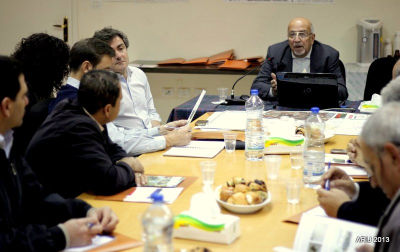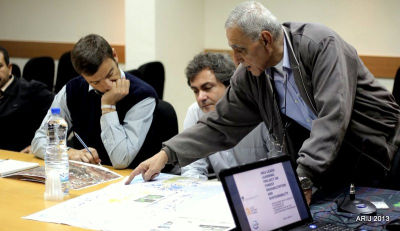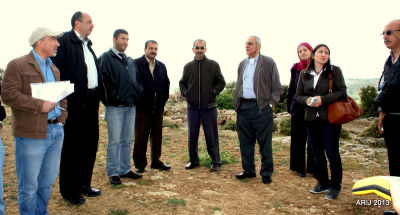Bethlehem 17 April 2013: The Applied Research Institute Jerusalem (ARIJ) and in partnership with the International Union for the Conservation of Nature (IUCN) has launched its project Palestinian Forests Sustainability and Rehabilitation, leading training and capacity building of local Palestinian partners in biodiversity and conservation programming.
Planned training involves experience exchange in the field of nature conservation, through introducing local NGOs to International criteria and standards for forests and Protected Areas’ restoration and management. Capacity building will further include inventory of forested areas, GIS and Remote sensing tools and applications, endangered species identification according to IUCN’s ‘Red List,’ green corridors setting and management plans for Protected Areas. In the process of this learning experience, ARIJ will take the lead in rehabilitating and setting national management plans for two Protected Areas of interest in the West Bank; Al Qarin and Umm at Tut.
On the 10th of April 2013, two conservation experts, Dr. Jose Tavares Vulture Conservation foundation (VCF) director based in Turkey and Dr. Luis Costa Society for the Study of Birds (SEPA) director based in Portugal has join ARIJ for a learning project; in response to ARIJ partnership with the IUCN/MAVA project entitled: “Nurturing NGOs Capacity to Engage in Biodiversity Conservation in Eastern Mediterranean”, which is funded by IUCN/MAVA foundation. The experts were welcomed by ARIJ to share the Palestinian nature conservation stakeholders their expertise in Protected Area management. Both experts participated in a two day technical workshop with field visit to the program’s targeted Protected Areas.
ARIJ General Director Dr. Jad Isaac opened the workshop at ARIJ’s main Bethlehem offices; welcoming the IUCN experts and attendees; highlighting the importance of protecting the remaining Palestinian natural resources in particular the biological resources. In attendance were a number of representatives from Palestinian Ministries (Ministry of Agriculture, Ministry of Environment, Ministry of Tourism, Palestinian Water Authority, Land Authority), local and international NGOs (Bethlehem University, PhG, PWLS, LRC, and UWAC), the UN and donor community (GEF/SGP).
A field trip was taken to introduce the experts and participants to Al Qarin Protected Area in Hebron Governorate. Head of Biodiversity and Food Security Department at ARIJ Mrs. Roubina Ghattas highlighted ARIJ’s methods for forested areas inventory, main findings of PFSR project and led the discussion regarding the importance for setting protected area management plan for the Palestinian protected areas (Al Qarin Protected area was proposed as a pilot study area), the legal framework and national strategy which currently exists and needs to be developed in terms of natural resource management and biodiversity protection. The two experts’ intervention was on revealing the best methods to set a plan for a protected area; focusing on raising a point concerning the importance of the area and the vision of each party for this forest. Participants had valuable inputs in the discussion. Accordingly a brief is prepared by ARIJ and the two experts about the discussed issues which will be forwarded to partners for their feedback.
On the 11th of April 2013, a mentoring day took place at ARIJ premises, where number of ARIJ staff representing the different related programs has participated.
A discussion between ARIJ staff and experts covered ARIJ’s organizational and technical strengths in terms of fundraising, partnership building and advocating biodiversity issues. This gave a chance for ARIJ to feedback to the experts and present challenges faced by the organization in carrying out biodiversity and conservation work in Palestine.
The experts gave a presentation outlining the fundamentals of Protected Area Management Planning, including interactions between the Palestinian Authority and neighboring communities and best practices for the sustainable utilization of forest resources. A special focus was also given to Palestinian Species Red Listing program, where main steps towards accomplishing this in response to IUCN red listing criteria was presented in details.
“It has been extremely rewarding and interesting to come and see the excellent work that ARIJ is doing, in a very difficult context”, said José Tavares, one of the IUCN consultants on biodiversity who visited ARIJ as part of the mentoring project in the MAVA-funded project in which ARIJ is participating. “I think there is scope for ARIJ to get more involved in documenting and prioritizing the biodiversity in this country”.
In addition, Luís Costa, IUCN’s consultant refers this visit to “inspiring and allowed to know the projects from ARIJ concerning the protection of natural resources in the Palestine. Good discussions took place and will hopefully help carrying out effective work to fill gaps in the assessment of present and future Protected Areas.”
All mentioned is being conducted through the project titled ; “Palestinian Forests Sustainability and Rehabilitation: Al Qarin Protected Area in the Southern West Bank and Umm at Tut Protected Area in the Northern West Bank within the Mediterranean Eco-system”, which is funded by GEF/SGP.



